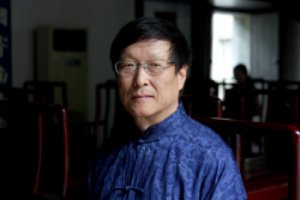Presented By: Confucius Institute at the University of Michigan
Kunqu Singers and their Performance of Ci Songs
Presented by Professor ZHOU Qin, Suzhou University, China

~Presented in Chinese with English translation~
Despite that ci songs from Song Dynasty of China (960-1279) are mostly enjoyed as poetry nowadays, they were sung as songs when the genre first emerged. The Song dynasty tradition of singing ci songs is now lost, but since mid-Qing, there is a tradition of avocational performers singing ci songs with kunqu or operatic vocal styles. This lecture introduces this performance tradition by clarifying differences between commercial performers (xigong) and non-commercial performers (qinggong) in the context of their artistic preferences, social functions, and repertories.
Professor Zhou Qin is a professor at Suzhou University, as well as the associate director of the Kunqu Research Center of China, the associate director of the Chinese Association of Kunqu and Gunqin Research, and a researcher at the Research Center of Jiangsu History and Culture. He was the principal coach for traditional singing and chanting practices for Peony Pavilion, the Young Lover’s Edition (2004). Currently, he hosts and teaches Kunqu yishu (The Art of Kunqu), a nation-wide online course in China. Devoted to promoting kunqu domestically and internationally, Professor Zhou has extensively toured China, Hong Kong, Taiwan, Germany, France, Japan, and the US. In 2004, the Suzhou municipal government awarded him a prize to acknowledge his efforts of preserving kunqu. In 2009, the Cultural Ministry honored him as a distinguished researcher on kunqu theory and history. Professor Zhou has published Cunxin shuwu qupu (Annotated Anthology of Kunqu Aria from the Cunxin Studio), Suzhou kunqu (Kunqu in Suzhou), Kunxi jicun (A Collection of Preserved Kunqu Scripts), and Fengying wunong (Five Kunqu Scripts).
Despite that ci songs from Song Dynasty of China (960-1279) are mostly enjoyed as poetry nowadays, they were sung as songs when the genre first emerged. The Song dynasty tradition of singing ci songs is now lost, but since mid-Qing, there is a tradition of avocational performers singing ci songs with kunqu or operatic vocal styles. This lecture introduces this performance tradition by clarifying differences between commercial performers (xigong) and non-commercial performers (qinggong) in the context of their artistic preferences, social functions, and repertories.
Professor Zhou Qin is a professor at Suzhou University, as well as the associate director of the Kunqu Research Center of China, the associate director of the Chinese Association of Kunqu and Gunqin Research, and a researcher at the Research Center of Jiangsu History and Culture. He was the principal coach for traditional singing and chanting practices for Peony Pavilion, the Young Lover’s Edition (2004). Currently, he hosts and teaches Kunqu yishu (The Art of Kunqu), a nation-wide online course in China. Devoted to promoting kunqu domestically and internationally, Professor Zhou has extensively toured China, Hong Kong, Taiwan, Germany, France, Japan, and the US. In 2004, the Suzhou municipal government awarded him a prize to acknowledge his efforts of preserving kunqu. In 2009, the Cultural Ministry honored him as a distinguished researcher on kunqu theory and history. Professor Zhou has published Cunxin shuwu qupu (Annotated Anthology of Kunqu Aria from the Cunxin Studio), Suzhou kunqu (Kunqu in Suzhou), Kunxi jicun (A Collection of Preserved Kunqu Scripts), and Fengying wunong (Five Kunqu Scripts).